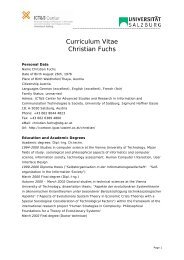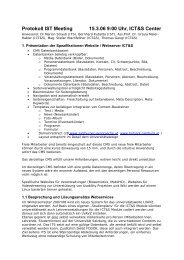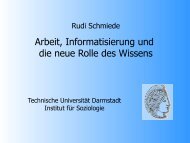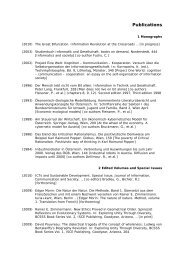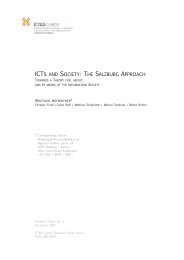CHRISTIAN FUCHS - ICT&S - Universität Salzburg
CHRISTIAN FUCHS - ICT&S - Universität Salzburg
CHRISTIAN FUCHS - ICT&S - Universität Salzburg
Create successful ePaper yourself
Turn your PDF publications into a flip-book with our unique Google optimized e-Paper software.
Christian Fuchs: Social Networking Sites and the Surveillance Society2007: 3f).Philip Graham (2000) argues that hypercapitalism’s immediacy and pervasiveness hasresulted in the entanglement of production, circulation, consumption, material andnon-material production, productive and unproductive labour, base and superstructure,forces and relations of production. Therefore value creation “becomes an immediate,continuous process” (Graham 2000: 137). New media are simultaneously used for theproduction, circulation, and consumption of knowledge. They support cognition(thought, language), communication (one-to-one, one-to-few, one-to-many, few-to-one,few-to-few, few-to-many, many-to-one, many-to-few, many-to-many), and co-operation(peer production, sharing, virtual communities, social networking, cyberlove, onlinecollaboration, etc) by combining the universal digital machine of the computer withnetworking functions as structural principles (Fuchs 2008). In informational capitalism,the brain and its bodily mediations are enabled to engage in organic practices ofeconomic production, surplus-value generation, co-production, communicativecirculation, and productive consumption by new media. The production of knowledgeis based on the prior consumption of the same, in co-production as well oncommunicative interchange as a coordinative mechanism. Consumption of knowledgeproduces individual meaning and incentives for further social production andcommunication. Circulation of knowledge is the consumption of bandwidth andtechnical resources and the production of connections.If the users become productive, then in terms of Marxian class theory this means thatthey also produce surplus value and are exploited by capital as for Marx productivelabour is labour generating surplus. Therefore the exploitation of surplus value in caseslike Google, YouTube, MySpace, or Facebook is not merely accomplished by those whoare employed by these corporations for programming, updating, and maintaining thesoft- and hardware, performing marketing activities, and so on, but by wage labour andthe produsers who engage in the production of user-generated content. New mediacorporations do not (or hardly) pay the users for the production of content. Oneaccumulation strategy is to give them free access to services and platforms, let themproduce content, and to accumulate a large number of produsers that is sold to thirdpartyadvertisers. Not a product is sold to the users, but the users are sold as acommodity to advertisers. The more users a platform has, the higher the advertisingrates can be set. The productive labour time that is exploited by the capital on the onehand involves the labour time of the paid employees and on the other hand all of thetime that is spent online by the users. For the first type of knowledge labour, new mediacorporations pay salaries. The second type of knowledge is produced completely forfree. There are neither variable nor constant investment costs. The formula for the profitrate needs to be transformed for this accumulation strategy:p = s / (c + v1 + v2), s … surplus value, c … constant capital, v1 … wages paid to fixedemployees, v2 … wages paid to usersThe typical situation is that v2 => 0 and that v2 substitutes v1. If the production ofcontent and the time spent online were carried out by paid employees, the variablecosts would rise and profits would therefore decrease. This shows that produsage in acapitalist society can be interpreted as the outsourcing of productive labour to userswho work completely for free and help maximizing the rate of exploitation (e = s / v) so30



